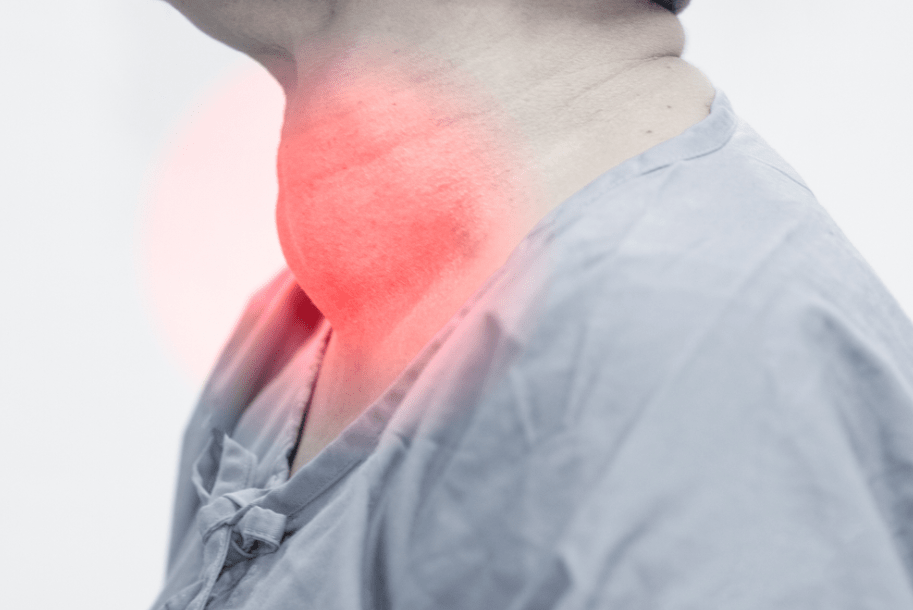Hyperthyroidism is a condition that arises due to the overactivity of the thyroid glands, which produce excess thyroid hormone. Although it can appear in anyone, it is up to 10 times more common in women than in men.
Causes of hyperthyroidism (hyperthyroidism reasons) include Graves’ disease and related immune system disorders. Hyperthyroidism symptoms (hypothyroidism was mentioned but appears to be a typo in the text; the context points to hyperthyroidism) are observed mainly as nervousness, heart palpitations, and often weight loss. One of the most well-known effects of hyperthyroidism is the protrusion of the eyes. Therefore, sensitivity to light and redness in the eyes are accompanying effects. The stages (hyperthyroidism stages) can also determine how the treatment will proceed. Early-diagnosed hyperthyroidism treatment may be easier compared to late-stage disease.
Hyperthyroidism can be treated, depending on the course, with medication. If it cannot be resolved with drug therapy, hyperthyroidism surgery (hyperthyroidism operation) may be deemed necessary by the doctor. Istanbul is a city with expert surgeons in the field of hyperthyroidism surgery. Patients undergoing surgery here can minimize the common hyperthyroidism surgery risks such as bleeding and infection. The price of hyperthyroidism surgery (hyperthyroidism operation cost) can vary depending on the patient’s health condition.
In hyperthyroidism treatment, considering the importance of the patient’s response to therapy, the treatment process is of great significance for the patient. Family members may also want to be informed about the disease to support the patient through this challenging period. Therefore, this article will provide detailed information on hyperthyroidism symptoms, stages, and risks; hyperthyroidism treatment options; types of hyperthyroidism surgery, associated risks, and the postoperative process.
| Causes | – Graves’ Disease: The most common cause of hyperthyroidism; an autoimmune disease. – Toxic Nodular Goiter: Nodules in the thyroid gland produce excess hormone. – Thyroiditis: Inflammation of the thyroid; in some cases, can cause temporary hyperthyroidism. – Excess Iodine Intake: Iodine-containing drugs or dietary supplements can increase thyroid hormones. |
| Symptoms | – Rapid or irregular heartbeat – Excessive sweating, hot flashes – Increased appetite but weight loss – Nervousness, anxiety, trembling hands – Muscle weakness and fatigue – Prominent eyes (may stand out in Graves’ disease) – Diarrhea, hair loss, and menstrual irregularities |
| Diagnostic Methods | – Blood Tests: TSH, T3, and T4 levels are measured; TSH is low, T3 and T4 are high. – Thyroid Ultrasound: Examines the size, nodules, and structure of the thyroid gland. – Radioactive Iodine Scan: Evaluates how much iodine the thyroid absorbs. – Graves’ Disease Test: Measurement of TSH receptor antibody. |
| Treatment Methods | – Anti-Thyroid Drugs: Medications like methimazole and propylthiouracil reduce thyroid hormone production. – Radioactive Iodine Therapy: Used to shrink the thyroid gland and reduce hormone production. – Surgery (Thyroidectomy): Preferred in cases unresponsive to other treatments. – Beta Blockers: Control heart rate and relieve symptoms. |
| Complications | – Heart Problems: Tachycardia, arrhythmia, and risk of heart failure. – Osteoporosis: High thyroid hormone levels can reduce bone density. – Eye Problems: In Graves’ disease, exophthalmos (protruding eyes) and vision issues. – Thyroid Storm: A sudden and severe hyperthyroid attack; requires emergency treatment. |
| Lifestyle Recommendations | – Regular exercise and meditation to reduce stress – Avoiding caffeinated drinks (can increase palpitations) – Healthy diet with sufficient calcium and vitamin D – Quitting smoking if applicable (especially important in Graves’ disease as it can worsen eye symptoms) |
| Follow-Up and Check-Ups | Regular blood tests are performed according to the treatment method. TSH, T3, and T4 levels are monitored at regular intervals, especially because there is a risk of hypothyroidism after radioactive iodine therapy or surgery. If anti-thyroid drugs are used, liver function tests should also be monitored. |
| Psychological Support | Psychological support or counseling is recommended for anxiety, nervousness, and mood changes triggered by hyperthyroidism. Stress management is also important. |
What Are the Symptoms of Graves’ Disease?
The symptoms of toxic goiter (hyperthyroidism) are quite mild in the early stages. Therefore, they may go unnoticed. However, as the disease progresses, symptoms begin to appear. The most common complaint is sensitivity to and intolerance of heat.
Patients with Graves’ disease feel overly warm even in weather conditions that healthy individuals find cold. The most common signs of Graves’ disease are as follows:
- Palpitations
- Sweating
- Rapid weight loss
- Hair loss
- Trembling in hands and feet
- Menstrual irregularity in women
- Diarrhea
- Decreased sexual desire
- Eye protrusion (exophthalmos) and a vibrant gaze
- More pronounced separation between nail and nail bed
What Are the Causes of Hyperthyroidism (Toxic Goiter)?
The most common cause of hyperthyroidism is Graves’ disease. Graves’ disease is an autoimmune disease in which the body produces antibodies against its own thyroid gland, causing it to overwork.
Another cause of hyperthyroidism is when the nodules in a goiter produce excess hormone. Usually, nodular goiter does not cause hyperthyroidism. However, if the nodules produce too much hormone, this condition emerges and is called toxic nodular goiter.
How Is Hyperthyroidism Diagnosed?
The most important point in diagnosing hyperthyroidism is that the physician considers the patient’s complaints could be due to hyperthyroidism. Hyperthyroidism can be easily diagnosed by measuring FT3, FT4, and TSH levels in the blood.
In such cases, TSH will be below normal, while FT3 and FT4 levels will be high. Thyroid Scintigraphy and Thyroid Ultrasonography are also frequently used.
How Is Hyperthyroidism Treated?
Hyperthyroidism treatment usually starts with medications that reduce hormone production in the thyroid. Within 1.5-2 months, thyroid hormone levels return to normal, and the patient’s complaints disappear. At this stage, three different treatment options can be pursued.
They are:
- Continuing drug therapy,
- Radioactive iodine therapy,
- Surgical treatment.
- The most suitable of these three methods should be chosen for the patient.
How Is Toxic Goiter Surgery Performed?
Primarily, the entire thyroid organ plays a critical role in cleaning out toxic goiter. However, in toxic goiter treatment, removing only a part of the thyroid gland and leaving the rest can cause recurrence of the disease; therefore, it is not recommended. If a nodule is detected in the patient before toxic goiter surgery, and to determine whether the nodule is cancerous, an fine-needle aspiration biopsy must be performed for examination and a conclusion reached. For patients who have nodules, the nodule is removed during surgery, and a pathology specialist performs a procedure called a frozen section on the thyroid tissue taken out during surgery to check whether there is a cancer risk.
What Are the Risks of Toxic Goiter Surgery?
The risks present in goiter surgery also apply to toxic goiter surgery. There are two main risks in toxic goiter surgery. The first is damage to the nerves leading to the vocal cords; the second is the risk of injury to the parathyroid glands, which are adjacent to the thyroid gland. The surgical techniques used to avoid harming other structures during the procedure are of great importance for minimizing these risks. Although the incidence of complications is low, it occurs in about one in every hundred people. A very small portion of them experience vocal cord paralysis or voice-related changes. Similarly, there are cases where the parathyroid gland ceases functioning, leading to a drop in the body’s calcium levels. This can cause dangerous muscle contractions and serious problems related to heart contractions.
How Long Does Toxic Goiter Surgery Take?
The surgery is generally completed within about two hours. In most toxic goiter surgeries, general anesthesia is employed, and the patient is put to sleep to start the procedure. The process from putting the patient to sleep, completing the surgery, and waking the patient afterward usually takes about one to two hours. This duration may vary depending on factors such as the patient’s age and condition.
Recovery Time After Toxic Goiter Surgery
The speed of recovery after surgery can vary depending on the patient’s age, overall health, and the type of procedure performed. Proper attention to the surgical wound and taking care of it after surgery are very important. Generally, the patient can start to return to daily life within about two weeks. Surgery, treatment, and recovery periods may differ from one person to another. The more careful the patient is, the faster the recovery.
How Should One Eat After Toxic Goiter Surgery?
Nutrition is of great importance for the thyroid gland to function properly. Consuming vegetables, fruits, fish, and other nutrient-rich foods is recommended. In other words, by reducing the consumption of refined flours, fats, and starchy foods, and favoring a diet rich in vegetables and fruits, the recovery process can be accelerated. With this dietary pattern, antioxidant vitamins such as vitamins A, C, and E are obtained. It is also important to consume iodized salt and foods rich in selenium during this period. Alcohol, cigarettes, and sugary foods negatively affect thyroid function and can cause numerous problems for the entire body.
Postoperative Considerations for Patients Who Have Undergone Toxic Goiter Surgery
After toxic goiter surgery, experiencing a sore throat is normal, but if it becomes unbearable, it’s important to consult a doctor. The doctor may prescribe medications to alleviate the pain and help the patient get through this period more comfortably. In general, one week is required before returning to daily activities. After one week, the patient can resume daily routines. Pregnancy immediately following toxic goiter surgery is not advised by doctors. If there is a calcium deficiency after surgery, calcium supplementation should be used. Numbness in the hands after toxic goiter surgery is sometimes encountered. The more caution is taken during this process, the easier the recovery.
Which Department and Doctor Should One Consult for Toxic Goiter Surgery?
Are you disturbed by toxic goiter disease? This disease currently affects many people and can significantly reduce quality of life. For these reasons, communicating with doctors promptly and making an appointment with the appropriate department is crucial for a quick recovery. So, which department and doctor should one consult for toxic goiter surgery? The Internal Medicine (Dâhiliye) department generally can help address your issues related to toxic goiter; however, you should also contact a private hospital for more information. This way, you can recover quickly and complete your healing process more rapidly.
How Much Does Toxic Goiter Surgery Cost?
Toxic goiter surgery varies depending on the state of the disease and where the surgery is performed. The disease may not progress in the same way in each individual. For this reason, your doctor always provides the most accurate information on this topic. Therefore, if you want clearer information about the process, you can consult your doctor.
Frequently Asked Questions About Hyperthyroidism (Toxic Goiter)
What does hyperthyroidism cause?
Hyperthyroidism, which develops due to the excessive activity of the thyroid gland, causes symptoms such as palpitations, sweating, restlessness, weight loss, trembling in the hands, hair loss, persistent diarrhea, sensitivity to bright light, protruding eyes, menstrual irregularities, and goiter.
Why does hyperthyroidism occur?
A quarter of hyperthyroidism cases are seen due to Graves’ disease, commonly called toxic goiter. It develops because the body reacts to itself, causing the thyroid gland to overwork. Additionally, interferons, iodine-containing medications, toxic nodular goiter, high hCG levels in the body, multiple pregnancies, molar pregnancy, pituitary adenoma, and thyroid cancer are other reasons for the occurrence of this disease.
Does hyperthyroidism resolve?
Hyperthyroidism can be permanently resolved by surgically removing the thyroid gland.
How does hyperthyroidism go away?
Treatment for hyperthyroidism usually starts with medication. If nodules grow and the patient’s complaints increase, the thyroid gland may need to be removed surgically. In addition to medication and surgery, radioactive iodine therapy is also among the methods used for treating this disease.
Does hyperthyroidism affect the eyes?
Among the most common signs of thyroid disorders is eye protrusion. With increased thyroid hormone in the blood, the eyeball grows, and due to pressure on the optic nerve, damage or inflammation can occur. Additionally, decreased vision, double vision, and impaired eye movement may be experienced.
What is a hyperthyroidism (thyroid) crisis?
A thyroid crisis involves dangerously uncontrolled hormone levels. Especially in older adults, such crises pose a very serious risk of death and, if not controlled, may lead to coma. They cannot be treated at home or resolve spontaneously, so hospitalization is mandatory.
When does toxic goiter go away?
For toxic goiter treatment, a sample is first taken from the patient, and a biopsy is conducted; a treatment protocol is then adopted according to the findings. Anti-thyroid drug therapy is started to eliminate the toxicity. Hormone therapy is also administered to balance thyroid hormone levels. This treatment can last from 1 to 2 years.
What happens if hyperthyroidism is not treated?
If hyperthyroidism is not treated, weight loss continues due to increased thyroid hormone in the blood. Heart failure and tachycardia may develop; if an infection is present, a thyroid crisis may occur, possibly leading to sudden death.
How should hyperthyroid patients eat?
Hyperthyroid patients should consume healthy fats and complex carbohydrates. Alcohol and caffeine should be very limited as they may interfere with thyroid medications. Saltwater fish should be avoided. Yellow and green vegetables should be preferred. At least 2 liters of water should be consumed daily, and non-iodized salt should be used. Vitamin D and calcium supplements should be taken during treatment.
Can hyperthyroid patients become pregnant?
Since excessive thyroid hormone production can disrupt the balance of reproductive hormones, it can lead to menstrual irregularities and ovulation disorders, reducing the chance of pregnancy and increasing the risk of recurrent miscarriages.
References:
https://www.endocrineweb.com/conditions/hyperthyroidism/surgery-hyperthyroidism









İstanbul'daki Muayenehane Konumu